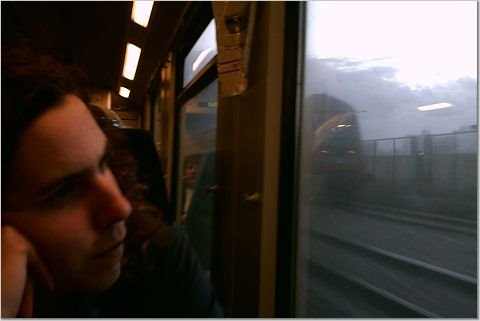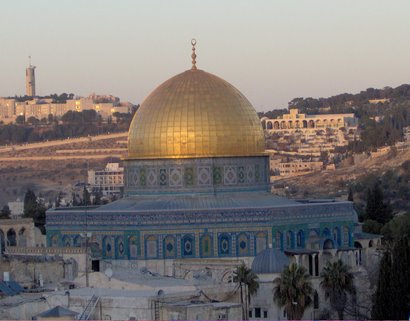To my family on Passover,
Ah, I feel so far away when I think of you all gathered around the table, soaking in the warmth of the best Jewish holiday, reveling in the wonder that is my mom and step dad (especially my mom, isn't she fantastic?), stuffing your faces with the most delicious food of the year. So much of me wishes that I could be with you this Pesach, but I am also still very present where I am--in the rolling hills of Palestine.
This Passover I am celebrating the holiday of freedom with friends in Palestine, in the small village of Haris where I live. I arrived here one month ago to volunteer with the International Women's Peace Service (IWPS) as the natural next step on my three month journey full of paradoxes and parallel universes that define the state of Israel and the West Bank. I participated in the Birthright Israel trip and then in an alternative program, called Birthright Unplugged that takes North American Jews on a tour of the West Bank to witness the lived experiences of Palestinians. I would love to talk to you more when I get back about my specific travels and experiences, but mostly tonight I wanted to send you my love and to give you a picture of what my Seder will be like, celebrated only a few hours before, and a few thousand miles away.
Tonight we are having 25 friends gather in our living room: Palestinians, Israelis, and Internationals. Present will be our friends Um and Abu Abed* who live in Haris and are the advisers for so many people in the village, including us. Um Abed's smile melts me when I walk by and I know that I can ask her any question and she will answer with love. Our friend Jamal and his family will also join us, who live in the nearby town of Qira. Jamal's 5 year old daughter, Saja, had a serious kidney condition when she was 6 months old and needed a transplant. They could not find her a donor until they became friends with Kris, a volunteer from IWPS who fell in love with the family and agreed to help them. Before Kris could go through with the operation, however, she was arrested and deported for participating in a nonviolent demonstration with Palestinians in protest of the Separation Wall that cuts them off from 100s of acres of their land. After one and a half years of human rights groups petitioning the Israeli government, Kris was allowed to go a hospital in Jerusalem where she gave Saja a kidney. Today Saja is healthy and strong but despite the binding connection between Kris and Jamal's family, they cannot meet again because Israel prevents her re-entry into Israel.
Huda and her daughters will also celebrate with us tonight from another village. Huda is one of the strongest women I have ever met. After her husband left her and her 5 children, she founded a women's organization, which is a collaboration of Palestinian women organizing to create positive change in their community. They create income for families through selling artistic embroidery and they have youth programs for music and for girls. Her daughters are impressive young women who love to sing and dance and speak perfect English that they learned from bad American movies.
Good friends of Huda's family are 8 sisters from yet another village who teach us what it means to be resilient and keep spirit alive. After having a slumber party at their house, they showed us the view out their kitchen window where I could see Tel Aviv and the Mediterranean Sea in the distance, although they are not allowed to go there and have never been. They joked that when we leave to go back to the U.S., they can watch our plane take off from the airport. The Separation Wall is located right outside their home and will soon encircle their village entirely. One of the eldest sisters is a student at An-Najah University in Nablus and her commute to school used to take one hour before the wall. Today it takes her 4 hours to go around the wall and through checkpoints to school.
Also sitting at our table tonight will be our friend Mohammad and his family who live in a nearby village called Marda. Mohammad is a local leader in the village, which is located directly under the second largest Jewish settlement on the West Bank, Ariel. The harsh reality of life in Marda is tragic. The sewage waste from Ariel is routed down the hill into the village. In the late 1990s, Birzeit University in Ramallah studied the water quality and determined that it is undrinkable even for animals. Families in Marda also experience virtually nightly raids by Israeli soldiers where boys and young men are woken by the soldiers, questioned, often physically assaulted, and returned to their homes or imprisoned. Last week two brothers--13 and 19 years old--were taken from their home, the eldest beaten by soldiers until he was unconscious. The soldiers took them into custody to question them about someone from the village throwing rocks on the main road--land that is 22 kilometers inside the West Bank, inside what is internationally recognized as Palestinian territory.
Several Israeli friends will also join us tonight who are eager to celebrate this holiday of liberation with their neighbors who are not free. They have seen and recognize that Palestinians cannot move from one place to another on their own land, they are willing to discuss real solutions for Israelis and Palestinians to live together. To our Israeli friends, Jews cannot celebrate Pesach without acknowledging and incorporating the hardship of the Palestinians into their story of today and the future.
This weekend I witnessed three young men in a neighboring village get arrested after a peaceful demonstration on their land against the wall that will fully cage them in when the construction is completed. I walked with the men--ages 16, 20, and 24 (the same age as me)--down the road while they were handcuffed and escorted by soldiers towards army jeeps that would take them into custody. I tried to find out why the men had been targeted since the protest had ended without violence or any confrontation with soldiers. The soldiers gave no explanation but they and everyone else knew that the young men had simply walked down the street at the wrong time. A pen in my hand, a camera, and a bright yellow vest, I walked next to the soldier who pulled the 16 year old by the plastic handcuffs that were tied too tightly around his wrists. I thought about Passover, about how that soldier no more than 20 years old, how I, how Jews all over the world can celebrate our liberation when the state of Israel was denying the freedom of peaceful protest right before my eyes.
Passover is my favorite Jewish holiday, in fact the only holiday that speaks to me in my gut. This year I am overwhelmed with the potential for real dialogue about the meaning of freedom when I can no longer look the other way at what is happening in Israel and Palestine, when I can sit at the table with friends who fight every day for their lives and laugh and sing and talk about hope.
I am with you tonight and send you my love.
Ma'salame,
Good night,
Nova Luna
*Names have been altered to protect identities.






